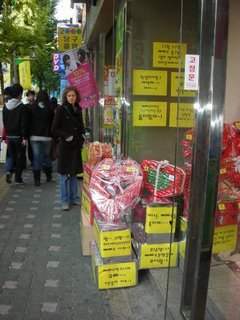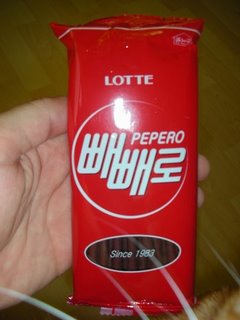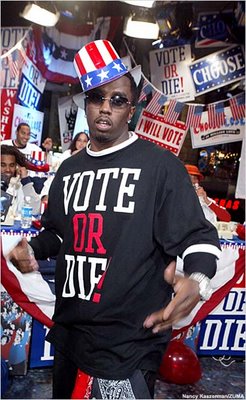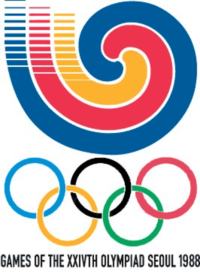
As some of you may know or remember, the vibrant jewel of northeast Asia, a burgeoning Seoul City played host to the Games of the 24th Olympiad.Totally unlike today, 1988 was a year of tension and upheaval. There was a war in Iraq. And one in Afganistan. The students of
Washington DC's Gallaudet University were in the throes of protest against the university administration. NASA's space shuttle
returned to flight after the entire shuttle program had been grounded. The New York Metropolitans lost the NLCS in 7 games. Thankfully, we live in more certain times. But, with the ubiquitous turmoil of 1988, the world desperately needed a moment to take pause and celebrate togetherness. Or was it diversity. Wait, togetherness through diversity? Maybe, togetherness despite diversity? Where are Nancy Reagan and Barbara Bush when you need 'em? The point is that we are the world and we celebrate our differences. What better way to do that than through an overcommercialized, duplicitious, putrid flim flam of an amateur atheletic contest rife with corruption, patronage and deceit?

A disgusting excersise in favoritism, the Olympics is one of this century's great
confidence games where the already rich line their pockets while perversely exploiting the World's athletic talent. And do not accept for one minute the fallacious claim that the Olympics brings any real or lasting economic benefit to the host nation. The whole thing is a total grift. I'll spare you the grim details as they are outlined most eloquently by the economist
Estimating the Cost and Benefit of Hosting Olympic Games: What Can Beijing Expect from Its 2008 Games? . Very basically, the promise of weatlh and economic windfall are propaganda tools of the organizing olympic committees. Empirically, communities see little to none of the promised benefit from these mega-events. A very cursory logic-based analysis should dismiss most Olympic proponents' (promoters) claims. Crafting and bribing your way into an accepted
Olympic bid is expensive. The promise of economic gain comes mainly from two sources: 1) the jobs created and business engaged to construct the event venues, 2) the tourist revenues. In this scenario, to expect the benefits should exceed the costs is an untenable hope. First, the exogenous demand for new construction projects, while seemingly positive for the local economy, presents a large opportunity cost. Wouldn't the construction companies and laborers already be committed to projects which serve long-term economic interests in the area? If you assume the labor and resources used for the construction do not detract from the local market equilibrium, that the workers and construction companies are essentially imported, then you can also assume the paychecks and profits to the contractors will be exported. Second, consider the logistical drain on existing public services and the externalities of a "
17-day party". What do you have to show for all the money spent and resources used? Quickly: single use faciliities which meet no long-term demand, tons of garbage and a hellish hangover. For Chicagoans, this phenomenon is tangible. How much infrastructure remains from the
1893 Columbian Exposition? In short, very little. Granted, what does remain are beautiful cultural institutions like the Museum of Science and Industry, The Art Institute of Chicago and the Field Musuem; but how many grand stone-work halls are slated for construction if
Daley gets the Olympics?

As for the promised tourist revenues, consider this: Athens spent $14 billion preparing for the most recent summer games. They took in $3 billion in revenues. How many olympic t-shirts and pins can the host city legitimately hope to hock? In short, hosting the olympics is an unproductive and inefficient use of capital. As the unrivaled lecturer Alan Sanderson said, "Can a Chicago Olympics ever pay for itself? Short-term, absolutely not. Long-term, as I've been quoted, maybe you break even." But I suppose it can give your city that warm, fuzzy feeling which usually accompanies excessive and conspicuous consumption.
To make matters worse, especially for the athletes, not only is the city selection process fundamentally flawed and mired in corruption and deciet, so are the games themselves. Do you remember the
Tonya Harding-Nacy Kerrigan-Jeff Gillooly fiasco? That event probably serves as the best microcosmic example of the Olympic's abusurdity. In the spirit of sportsmanship , honor and a fairplay, Tonya conspired with her husband, Jeff, to attack her teammate, Nancy. But this isn't even the best part. The best part is when Tonya weeps to the judges pleading for a "reskate" because, well, her boot-lace was too short. The judges all too sympathetically grant her request. She finishes 8th.
Maybe you are too young to have witnessed that hysterical scene play out. Or, perhaps you are too old and your memory is hazy - they say it's the first to go. In either case, do you recall the 2002 winter games? The organizers at this event had to award two gold medals in the pairs figure skating category. allegedly the result of a
inter-coutry faustian quid-pro-quo, the Canadian pair's flawless performance was awarded a silver medal behind the Russians, who fell during their routine. Inconsistent, unfair and downright dirty judges do not reside solely in the ice events nor in just the winter games for that matter. The history of olympic malfeasance is long and sordid.
In fact, Seoul's Olympiad had its fair share of controversy. So
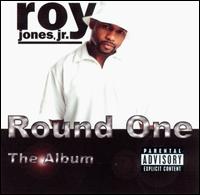
However, it was the Light Middleweight (71 kg) gold medal bout which still haunts the greatest pound-for-pound fighter to ever live. Roy Levesta Jones Jr. landed 86 punches to his opponents 32, yet still lost the fight in a 3-2 decision. The judges voting against Jones were all eventually suspended. Jones even received an apology from his opponent, Park Si-Hun. I'll bet you can guess what country he called home. That's right, South Korea. Maybe the victory could be attributed to homefield advantage.*** Roy Jones Jr would not be the last hip-hop star to grace Seoul's Olympic venue.


On October 20, 2006, the Olympic park appropriately played host to the most divisive uniter in the contemporary hip-hop scene. Straight from Bed-Stuy, Marcy Projects' very own, Jay-Z. Jigga who? Jigga what. Hova. Hov. S-dot. Iceberg Slim. Lucky Lefty. The Godfather of Hip Hop, Shawn Carter. His monikers are exceeded in number only by his talents.

Rhyme spitter, cross-stitcher, corporate exec, emcee, dj, jeweler, producer, media mogul, brand manager, promoter, real estate speculator, beyonce copulator, rap impressario straight outta the black barrio. Ok, that last reference is to UGK's Bun B, but I just like the line so much...S. Carter, the man himself descended upon Seoul with only the help of two turn-tables and a microphone. Oh, and a box full of samples, the Green Lantern on 'the ones and twos', Memphis Bleek as the holla back man, a small stage posse, the off-stage entourage, security, managers, assistants, bling attendants and the spiritual presence of all the hip-hop greats to have preceded him.

That's right. Not only was the now-not-so-Young Hova on stage, but so were Jam Master Jay (Run DMC), Biggie Smalls, Tupac Shakur, and Aaliyah. Somewhere before the pre-packaged Beyonce cameo (which contrary to rumor and consistent with Jay's "sorry, no beyonce tonight, not this time" pronouncement did not include beyonce herself, merely Memphis Bleek sheepishly singing her parts) and after the abridged medly of hits (no more than 3 verses of any one song), Jay paid tribute to these hip-hop icons. Through their unique urban poetry and inspiring beats, he brilliantly karaokied for an end to violence in the hip-hop community.

The impassioned plea for unity was symolic of the venue, the Olympic stadium where nations lay down their arms and forget their differences and celebrate togetherness.
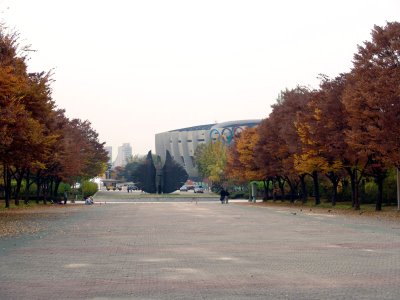
I was moved, nearly to tears, when I realized he woefully neglected to lobby with equal vigor for tighter scrutiny of
unlicesned pilots and properly ballasted Cessnas. Aaliyah, we hardly knew ye.
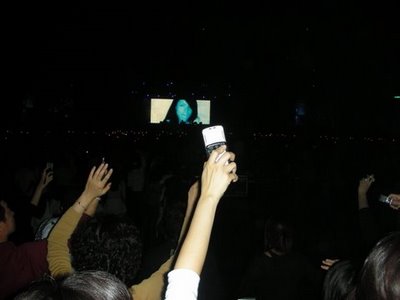
*** Also on the 1988 US Olympic boxing team, Ray Mercer and Riddick Bowe. Mercer won a Heavyweight division which featured Poland's Andy Golota. Bowe lost the Super Heavyweight by TKO to the great British-born-but-representing-Canada pugilist, Lennox Lewis. Years later, Bowe would fight Golota professionally, in a Madison Square Garden match that would feature a low blow, a disqualification and a riot. I love professional boxing.
 I recently had the esteemed honor of attending the Korea Institute of Finance's (KIF) Annual Symposium. This year's Symposium marked the KIFs 15 year anniversary. Like any other arbitrarily assigned anniversary celebration, this conference was a big deal. I guess 15 is a good 'round' number - but it's definitely no 25. The KIF pulled out all the stops.
I recently had the esteemed honor of attending the Korea Institute of Finance's (KIF) Annual Symposium. This year's Symposium marked the KIFs 15 year anniversary. Like any other arbitrarily assigned anniversary celebration, this conference was a big deal. I guess 15 is a good 'round' number - but it's definitely no 25. The KIF pulled out all the stops.  From the grand reception to the luncheon to the superstar international celebrities to the neat little 3-ring binders, no expense was spared. They even had those cool translator channel radio tuners and earpieces like you see in news footage of the UN.
From the grand reception to the luncheon to the superstar international celebrities to the neat little 3-ring binders, no expense was spared. They even had those cool translator channel radio tuners and earpieces like you see in news footage of the UN. Among the eminent dignataries and VIPs were the IMF's Dr. Raghuram Rajan and Dr. Stijn Claessens, the world's foremost expert on financial services sector corporate governance reform. Sounds utterly scintillating, right? Of course, wtih this kind of star power, the paparazzi devoted countless photogs (1),
Among the eminent dignataries and VIPs were the IMF's Dr. Raghuram Rajan and Dr. Stijn Claessens, the world's foremost expert on financial services sector corporate governance reform. Sounds utterly scintillating, right? Of course, wtih this kind of star power, the paparazzi devoted countless photogs (1),  dispatched innumerable video cameras (2) and assigned dozens (5) reporters from international (local) news networks. For me, the highlights of the event were the hotel luncheon (formal Western meal) and the reception (open bar). Oh, and the deeply insightful presentations on financial sector reform and the future of economic growth in Korea blah, blah, blah.
dispatched innumerable video cameras (2) and assigned dozens (5) reporters from international (local) news networks. For me, the highlights of the event were the hotel luncheon (formal Western meal) and the reception (open bar). Oh, and the deeply insightful presentations on financial sector reform and the future of economic growth in Korea blah, blah, blah.
 The luncheon was particularly enjoyable due to the fact it was one of the few meals of recent memory where, relative to my tablemates, I knew what the hell I was doing.
The luncheon was particularly enjoyable due to the fact it was one of the few meals of recent memory where, relative to my tablemates, I knew what the hell I was doing.


 Most prominently, perhaps, the open bar served only Jack, scotch and wine. Not so open, after all. The Empire never made it to this peninsula, so don't expect to find any gin over here. Another notable difference was the showmanship. The organizers of the event were not content to have a KIF executive or staffer serve as the master of ceremonies. No, the KIF contracted with a corporate event announcer - a professional emcee. Now, I'm sure this exists in the occident as well as the orient, but it was totally new to me. In any case, I was mesmerized by his voice. His smooth tone and well-inflected delivery suggested a failed career in radio broadcasting. Can't you just imagine him starting out as a promising college radio dj, getting hired by the top station in Seoul, then being involved in some scandal, probably a result of an on-air gaffe and getting relegated to piddly corporate events work, introducing total strangers at receptions and awards banquests, barely eeking out a meager living, biding his time until he can make that one last run toward radio fame?
Most prominently, perhaps, the open bar served only Jack, scotch and wine. Not so open, after all. The Empire never made it to this peninsula, so don't expect to find any gin over here. Another notable difference was the showmanship. The organizers of the event were not content to have a KIF executive or staffer serve as the master of ceremonies. No, the KIF contracted with a corporate event announcer - a professional emcee. Now, I'm sure this exists in the occident as well as the orient, but it was totally new to me. In any case, I was mesmerized by his voice. His smooth tone and well-inflected delivery suggested a failed career in radio broadcasting. Can't you just imagine him starting out as a promising college radio dj, getting hired by the top station in Seoul, then being involved in some scandal, probably a result of an on-air gaffe and getting relegated to piddly corporate events work, introducing total strangers at receptions and awards banquests, barely eeking out a meager living, biding his time until he can make that one last run toward radio fame? 
 I just don't suppose this job is the ultimate career for aspiring vocal talent. But hell, for all I know this guy is Korea's answer to Billy Crystal. Really, though, he had some great pipes.
I just don't suppose this job is the ultimate career for aspiring vocal talent. But hell, for all I know this guy is Korea's answer to Billy Crystal. Really, though, he had some great pipes.

















